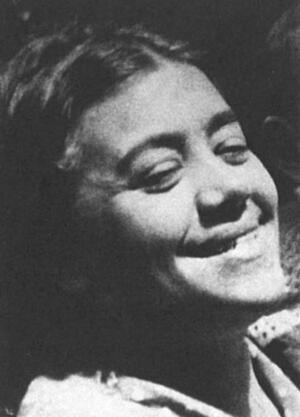Yiddish poetry: It's not just for men!
Most people believe that Yiddish literature and poetry was written solely by men. In reality, there were hundreds of female Yiddish writers and poets, all of whom had their own distinct biographies and writing styles.
Edith Kaplan Bregman was one of these women. She was born in a Russian shtetl in 1899 to a Hasidic family, immigrating to New York when she was 13. In America, she was exposed to literature that hadn’t been available in Europe, so she became a voracious reader. Bregman went on to write poetry in her native tongue, Yiddish. Her love of language led her to meet many Yiddish literary giants, like Avrom Reyzen, a poet who became her mentor. While she wrote poems throughout her early life, her works weren’t published until 1939, when a Yiddish newspaper had a poetry contest that she entered and won. Her victory gave her the confidence to publish more of her written work. Some of the themes that recur throughout her poems are a love of Judaism and God, life in Europe, and Holocaust remembrance. In addition to writing poetry, Bregman sang and played the mandolin and piano. Bregman’s last poem was published in 1997, a few years before her death at age 99.
Another Yiddish woman poet was Celia Dropkin (1887-1956). An eager student, she was formally educated for most of her youth in Belarus. She began writing poetry in Russian at age 10 and was encouraged to keep writing by Uri Nissan Gnessin, a Hebrew poet who she became close with. After getting married, Dropkin immigrated to New York. She began translating her Russian poems into Yiddish and published them in several leading Yiddish literary magazines. While some of Dropkin’s works were about her life experiences and children, she is famed for her passionate poetry about sex, eroticism, love, and relationships, themes that resonate with readers today. In the early 1900s, most people thought that Jewish women only wrote tkhines, Yiddish prayers often concerning domestic matters and child-rearing; Dropkin challenged that. While a number of critics felt that her works were too personal and too overtly sexual, her contemporaries were generally positive about her writings. Modern-day Yiddish enthusiasts have not forgotten Dropkin’s contributions to Jewish literature, as her poems have been published in several contemporary Yiddish anthologies and set to song by klezmer bands.
Some female Yiddish poets went out of their way to address women’s issues in their poetry. Kadya Molodowsky was one such woman. Born in 1894 in a Russian shtetl, her poetic career began in 1920, when she published her first poem. She married and moved to Warsaw shortly afterward, where she became active in the Yiddish Writers Union. Many of her works celebrate and discuss Jewish women and their role in the world. Her first book of poetry, Nights of Heshvan, is written from the point of view of a Jewish woman in her 30s who moves throughout Eastern Europe, like Molodowsky herself. It was received to wide acclaim. Another book of poetry, Freydke, features a narrative poem about a Jewish working-class woman. After immigrating to New York, Molodowsky wrote From Lublin to New York: Diary of Rivke Zilberg, a book of poems about a Jewish woman immigrant. She also wrote a column for The Forward about great Jewish women, as well as publishing a long poem about Gracia Mendes, a Portuguese Converso who saved innumerable Jews from the Inquisition. Molodowsky also cofounded and edited a Yiddish literary journal, Svive. Other themes she wrote about included poverty, children, Judaism, the Diaspora, Zionism and Israel, and the Holocaust. Her lifetime of achievement in poetry was recognized when she received the Itzik Manger Prize, the most prestigious award in Yiddish literature, in 1971.
Yiddish women poets paved the way for modern Jewish women writers, impacting aspiring poets from Gertrude Stein to Adrienne Rich to Vanessa Hidary. May we learn from the legacy they left us and make the world a better place because of it.








Hello, you are welcome from the site
http://downloadiya.com/
The Judaic Studies program at the University of Manitoba in Canada has the following website which contains some beautiful recordings by native speakers of Yiddish women's poems and stories. Copied in below is the text to the website and the URL. RT
Recordings of Yiddish Stories and Poems by Women Writers read by members of the Winnipeg Yiddish WomenÌ¢âÂã¢s Reading Circle
(recorded in 2011 and 2012)
The Winnipeg Yiddish WomenÌ¢âÂã¢s Reading Circle meets monthly in order to read, hear, and discuss stories and poems by female Yiddish authors that would otherwise be forgotten. By rescuing the stories of these writers, the participants in the Reading Circle are also able to enjoy listening and speaking their mameloshn, or mother-tongue.
Yiddish was the language of Central and Eastern European Jewry and was brought to Winnipeg by Jewish immigrants. Many of the women in the Reading Circle are the children of immigrants and thus grew up in Yiddish-speaking homes. Some of them were students at the I. L. Peretz Folk Shul, a Winnipeg Yiddish-language school that was the first full-time Jewish day school in North America. Other members immigrated to Winnipeg from Europe after the Holocaust.
The Winnipeg Reading Circle has been remarkably active since its inception in 2001. In 2007, the group published an anthology of English translations of their favourite stories, Arguing with the Storm: Stories by Yiddish Women Writers, edited by Rhea Tregebov (Toronto: Sumach Press and New York: The Feminist Press CUNY). The Reading Circle was also recognized by the UNESCO and was included in its Register of Good Practices in Language Preservation.
Yiddish is no longer spoken or understood by the majority of Ashkenazi Jews (Jews of Central and East European origin). The women of the Winnipeg Reading Circle belong to an increasingly small group of Winnipeggers fluent in the language. The stories and poems presented here have been translated into English, but the women who read these stories for you hope that by listening to the original Yiddish, even those who do not understand the language will get an impression of the humour, linguistic musicality, and emotional depth in the Yiddish language and Yiddish literature.
ÌÑã¢ÌÑå_ÌÑÛÓÌÑå¤'ÌÑåÁ ÌÑÛÓÌÑÒÌÑå Yitskhoks kholem - IsaacÌ¢âÂã¢s Dream Written by Chava Rosenfarb; read by Edith Kimelman. In this poem, the author meets with the Biblical Patriarch Isaac and contemplates the meaning of youth, human sacrifice and the place of Torah in post-Shoah Jewish culture. Recording
ÌÑåÌÑã¢ÌÑÁ ÌÑÛ¢ÌÑÛ¢ÌÑåÌÑèÏÌÑÒ ÌÑåÌÑå¬ÌÑã¢ÌÑã¢ÌÑåÊÌÑÛªÌÑå¢ÌÑÛªÌÑåÌÑåÊÌÑÛªÌÑå¢ÌÑü ÌÑåÌÑã¢ÌÑü ÌÑå ÌÑå©ÌÑÛ¢ÌÑÒÌÑå¢ÌÑÛ¼ÌÑÒ Ikh volt arayngegangen in a shulekhl - I Would Go into a Prayer House Written by Chava Rosenfarb; read by Edith Kimmelman. In this moving and musical poem, Chava Rosenfarb, a life-long atheist, struggles with the concept of a belief in God after the Holocaust. Recording
ÌÑå ÌÑå©ÌÑèÏÌÑÛ¢ÌÑÛ÷ ÌÑ_ÌÑã¢ÌÑèÏ ÌÑÛÒÌÑã¢ÌÑÛ÷ÌÑü ÌÑå_ÌÑå¢ÌÑåÊÌÑåÁÌÑèÏÌÑå¢ÌÑå¬ A shtub mit zibn fenster - A House with Seven Windows Written by Kadya Molodowsky, read by Arnice Pollock. This short story is about a strong-willed, wealthy and talented Jewish woman in Poland whose Zionist passion was lit in the late-19th century, when most Jews thought that only the Messiah would bring about a Jewish state. Against the wishes of her husband and the mores of the time, Bashke Paperno moved her household goods and children in order to establish a Jewish town in the Holy Land. Recording
ÌÑå ÌÑÒÌÑã¢ÌÑÛ÷ÌÑå¢ A libe - A Love Story Written by Sarah Hamer-Jacklyn, read by Luba Cates. In this humorous short story, lovers meet as young adults, break up and then meet again as elderly residents of a retirement home. Love, passion and jealousy sweep both Malkaleh and Chatzkeleh away, and they nearly part once more. Recording
ÌÑÛªÌÑå¢ÌÑÛ÷ÌÑå¢ÌÑåÊÌÑèÏÌÑå©ÌÑå¢ ÌÑÛÌÑå¢ÌÑåÊÌÑèÏ Gebentshte hent - Blessed Hands Written by Frume Halpern, read by Esther Leven. A masseuse reflects on her life as both a healer and as an employee of the rich. Although Sarah wants to only help the needy and the genuinely ill, she must also serve those who can afford to pay. Recording
ÌÑå ÌÑ_ÌÑÛÒÌÑÒ ÌÑå_ÌÑÛ¢ÌÑü ÌÑå ÌÑå_ÌÑå¢ÌÑå¬ÌÑå¢ÌÑåÊÌÑå¢ A mazl fun a perene - The Luck of a Featherbed Written by Bella Goldworth, read by Lil Frohlich. In this story a feather-duvet takes a trip from a small shtetl in Europe to an immigrantsÌ¢âÂ㢠apartment in America, and eventually back to Europe to help needy refugees. Bella Goldworth uses the feather duvet as a symbol of love that can supersede borders and history. Recording
ÌÑå¬ÌÑÛ¢ÌÑ_ÌÑã¢ÌÑÛ ÌÑåÌÑÛ¢ÌÑü ÌÑÛÏÌÑå¢ÌÑå¬ ÌÑå©ÌÑÛ¢ÌÑå_ÌÑå¬ Rumiya un der shoyfer - Rumiya and the Shofar Written by Rikudah Potash, read by Luba Dimerman. Rikuda Potash is an example of how Yiddish literature thrived in Israel as well as in Europe and North America. This short story examines how an uneducated but spiritual woman insists on claiming a Jewish ritual that was once only practiced by men. Recording
ÌÑåÌÑå±ÌÑåÁ ÌÑå¬ÌÑÛ÷ÌÑ㢠Oys rebe - No More Rabbi Written by Sarah Hamer-Jacklyn, read by Roz Usiskin. In this funny little story, a shtetl family wonders if a blessed baby boy, once thought to be destined for a future as a rabbi, can be rendered non-kosher through the actions of a kind-hearted non-Jewish nurse. Recording will be posted soon.
This project was administered and executed with much dedication and care by Sharon Graham in cooperation with the Centre for Creative Writing and Oral Culture. We are grateful to Marco Cordeiro, Sound Technician and Research Assistant at the Centre for his patient and skillful assistance, and to director Warren Cariou for his unwavering support. Matthew Leibl generously donated his time and recorded the Yiddish music for the stories, and we thank Jonathan Sirski,IST Instructional Technician, for his assistance with setting up the audio links for this website. Moreover, we are indebted to Rhea Tregebov from the Creative Writing Program at the University of British Columbia for initiating this project and to the I.L. Peretz Folk School Endowment Trust as well as the Centre for Creative Writing and Oral Culture for their most generous financial contributions. And finally, we thank the women from the Winnipeg Yiddish WomenÌ¢âÂã¢s Reading Circle who selected these short stories and who read them for us and for all of you.
http://umanitoba.ca/faculties/...
Cila Melamed's work is barely known in the U.S. She wrote this passionate Yiddish poem when she was a political prisoner in Latvia in 1928. German Yiddishist Doro Greve (who befriended Cila in her later years and translated her work into German) shared the poem with me in the late nineteen eighties. I interpreted "Hiperfantazye" using my own translations (one literal and one impressionistic) along with the original Yiddish lyrics and additional lyrics I wrote for the bridge) as a ballad called "Blue Dress." It is set to the beloved habanera "Veinte Anos" composed by Cila's contemporary, the great Cuban singer-songwriter-guitarist Maria Teresa Vera.
This Yiddish-Cuban-American-20th-21st century cross-pollination called "Blue Dress (Veinte Anos)," with arrangement and guitar solo by Rick Arnoldi, was released April 2011 on my second album of originals "atmosphere." It's available via cdbaby and itunes-- see http://itunes.apple.com/us/alb...
Here is the original Yiddish: khÌ_å_vel a kleyd mir fun di volkns makhn un di zun vet zayn mayn hut mayne shikh di friling blumen, mayn gedank der foygl hoykh in luft sÌ_å_vet alts shklaf dos lebn dinen, un der toyt vet zayn mayn fraynd sÌ_å_veln zikh yorn gikh tserinen Ì¢âÂÛÏÌ¢âÂÛÏ der moment vet eybik zayn
my literal translation: I'll make my dress out of the clouds and the sun will be my hat my shoes will be spring flowers, my thought a bird in flight Life will be my servant; Death will be my friend The years will flow like water-- the moment never end.
It was a profound inspiration and honor to co-create this song with two extraordinary enduring spirits from two different worlds...with deep thanks to Dorothea Greve, to Cila's daughter Aviva Edilkind and Maria Teresa Vera's heir Caridad Jorlen Vera.
An illustrated broadside of "Blue Dress" can be downloaded from jerushamusic.com website.